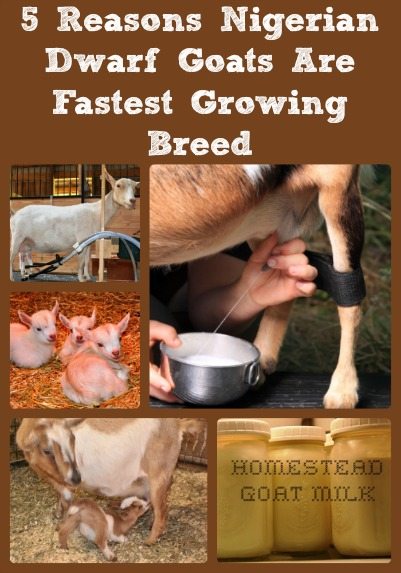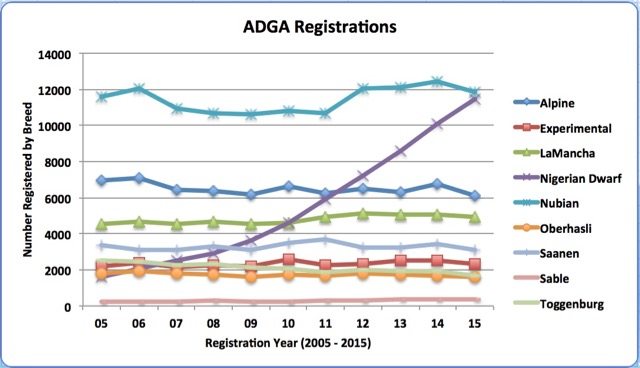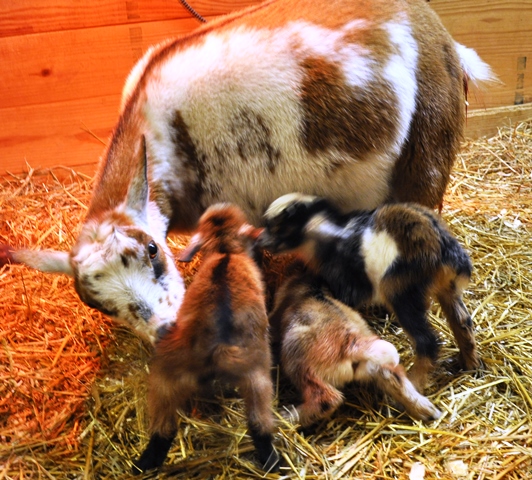
Nigerian Dwarf (ND) goat ownership is growing faster than any other dairy breed in the US because they make such great additions to the homestead – regardless of whether the homestead is large, small, rural, urban, or suburban.
The American Dairy Goat Association (ADGA) is only one of the registries that accept Nigerian Dwarf goats, but it’s a good indicator of what’s happening. As you can see in Figure 1 below, while the number of goats registered for other breeds are remaining constant or dropping, Nigerian Dwarf numbers are taking off! They are even beginning to overtake the ever-popular Nubians.

Figure 1 – ADGA Registrations
Here are the top 5 reasons why Nigerian Dwarf Goats are becoming so popular:
Wonderful Milk
A Nigerian Dwarf doe will produce an average of 800 lbs. (about 95 gallons) of fresh milk per year. And, they produce milk that has higher butterfat content than any other dairy goat breed (from 6 – 10%), making the milk taste milder, sweeter, and creamier. Everyone loves ND milk once they taste it! This means that 2 or 3 ND does can supply enough milk for an average family for a year, and because of their size, keeping 2 or 3 does is often possible. For many families, it’s more practical to own a couple of small goats that produce a small and consistent amount of milk, rather than one large cow that produces a lot.
Small Size
ND’s are similar to a large dog in size, and are fine-boned proportionately small dairy goats (not the stockier Pygmy goats). They stand approximately 21″ high and weigh about 75 lbs. when fully grown. Given their small size, two can live in about 50 sq. ft. if they also have access to outside pasture space. This makes them feasible for rural, suburban, and even urban settings – many cities have begun allowing ND does. ND housing does need to be well fenced as they tend to be escape experts.
Easily Handled
Their small size makes them easy to handle even for women and children, and they make excellent livestock projects for kids. They are very affectionate, enjoy attention, and form bonds with both their herd and people. Each goat has a distinct personality, and when socialized frequently form birth on, are quite easy to manage. They tend to act more like dogs than livestock, and it’s easier to convince friends or neighbors to farm sit for a few ND’s as opposed to larger livestock.
Year-Round Kids
ND’s can be bred year-round (most goats can only be bred during fall), making it possible to spread kidding and the milk supply over the year. This eliminates an overabundance of milk in spring and shortages later on. The does are prolific too, and usually have at least twins or triplets. The kids are adorable (it’s impossible not to be happy in a barn full of bouncing ND kids), and kids from good bloodlines can be sold for around $300 to $500 each. Many choose not to keep bucks (which are very strong-smelling during fall), and simply use buck services from another farm when breeding does.
 Feeding
Feeding
From an efficiency standpoint, goats convert their food into milk more efficiently than cows or sheep, and among the dairy goat types, ND’s convert their food more efficiently than any other dairy goat breed. And goats like to browse rather than graze like cow or sheep, so traditional pastures aren’t required. ND’s can be turned loose in “wooded” pasture areas where they’ll help control poison ivy, blackberries, multiflora rose, etc. – all those things we consider nasty weeds they think are tasty. It also takes a lot less room to store hay and feed for a couple of ND’s as opposed to larger livestock.
For those wanting wonderful tasting, hormone and antibiotic free milk, and animals that are easy to handle, feed, and house; ND’s are increasingly the answer. The fact that they’re lovable and adorable too doesn’t hurt.
 Feeding
Feeding
Melissa Sheldon says
Thank you for all the great info on these beautiful little goats. We are thinking about getting three ourselves. We will certainly be looking out for more info in the future.
Tasia @ The Frugal Farm Girl says
We are thinking of this breed for our first experience with goats and this article confirms I think it is the right choice! I am so excited to get started I can’t wait until the spring as we grow our farm!
Lesa says
Hi Tasia, I think you will really love them. Congratulations!
penny hunt says
Where can I fine these goats I live in Alabama.
Lesa says
Hi Penny, Google “Nigerian Dwarf Goats Alabama” – you’ll get a listing of farms with websites that are in Alabama. You can start there.
Charla Childs says
Thank you so much for this great information I am wanting to get a couple of goats this coming Spring I live in Tampa and I may be calling on you for info. I really enjoy reading your blog and have learned a lot Thank you Charla
Lesa says
Hi Charla, Thank you for reading the blog, and I’m glad it’s been helpful. If you want to call for more info, I’m always happy to share what I’ve learned and try to help 🙂